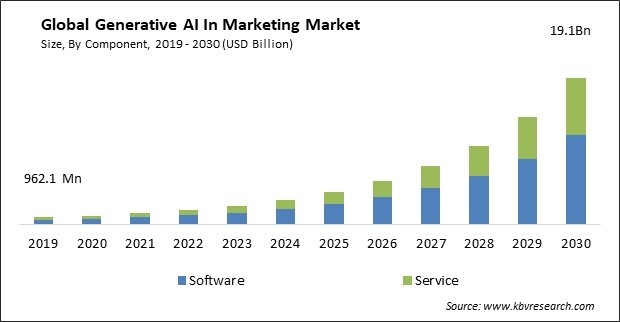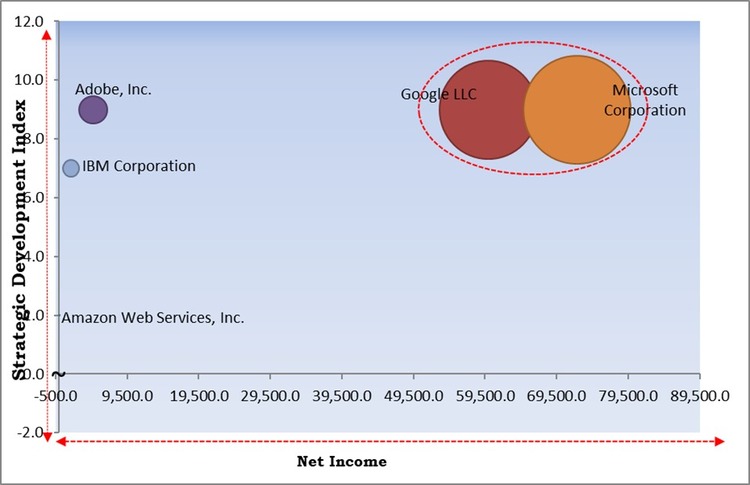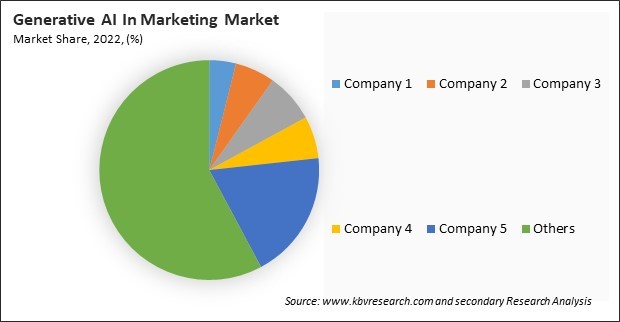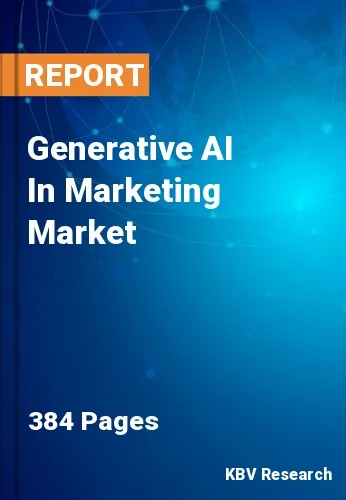The Global Generative AI In Marketing Market size is expected to reach $19.1 billion by 2030, rising at a market growth of 34% CAGR during the forecast period.
Generative AI's ability to create, personalize, and optimize content for various channels enhances the reach and impact of multichannel marketing efforts, helping businesses engage with their audiences effectively in an increasingly diverse and competitive digital landscape, and as such would lead to Content generation occupying nearly 1/5 of the total market share by Application segment by 2030. Generative AI translates content from one language to another, expanding the reach of marketing campaigns to international markets. Additionally, it can help localize content to resonate with specific cultural nuances. AI-generated content is adapted and customized for various marketing channels, including websites, social media, email marketing, and more. This ensures that content remains relevant and consistent across platforms. AI-powered tools curate content from diverse sources, allowing marketers to share relevant and trending content with their audiences. This helps maintain a content-rich online presence.

The major strategies followed by the market participants are Partnerships as the key developmental strategy to keep pace with the changing demands of end users. For Instance, In June, 2023, Adobe, Inc. extended its partnership with IBM Corporation to assist brands in effectively expediting their content production processes, by utilizing advanced AI technologies, including Adobe Sensei GenAI services and Adobe Firefly. Furthermore, In August, 2023, Microsoft Corporation joined hands with IBM Corporation to assist mutual clients in expediting the implementation of generative AI. The companies aimed to drive innovation in their business processes and effectively expand the use of generative AI that would help customers responsibly accelerate the deployment of generative AI.
Based on the Analysis presented in the KBV Cardinal matrix; Google LLC and Microsoft Corporation are the forerunners in the Market. In August 2023, Google Cloud, a cloud platform offered by Google LLC, partnered with Contextual AI, Inc., the company building AI that works for work, to develop, operate, and expand its expanding enterprise, as well as to train its extensive language models (LLMs). The company provides customers with unmatched flexibility and performance and is enthusiastic about backing Contextual AI's exceptional team of AI visionaries as the company develops next-generation LLMs for the enterprise using Google Cloud. Companies such as Adobe, Inc., IBM Corporation, Amazon Web Services, Inc. are some of the key innovators in the Market.

Continuous advancements in generative AI, including natural language processing (NLP) and computer vision, have made it more capable of producing high-quality content and understanding context, leading to improved marketing outcomes. Improvements in deep learning and natural language processing have led to AI models that can generate higher-quality written content, including blog posts, product descriptions, and social media posts. This helps marketers maintain a consistent and professional online presence.AI models have become better at understanding and analyzing user behavior, preferences, and historical data. This enables marketers to deliver highly personalized content and recommendations, improving user engagement and conversion rates. AI models generate images and videos, expanding the range of automated marketing content. This is particularly valuable for visual platforms like social media and e-commerce websites.
AI helps marketers expand their libraries by summarizing lengthy articles, translating content into multiple languages, and generating content for various niches and topics. Generative AI automatically generates a wide range of content, including blog posts, articles, product descriptions, social media posts, and more. This automation conserves time and resources while ensuring content consistency. Generative AI translates content from one language to another, expanding the reach of marketing campaigns to international markets. Additionally, it can help localize content to resonate with specific cultural nuances. AI-generated content is adapted and customized for various marketing channels, including websites, social media, email marketing, and more. This ensures that content remains relevant and consistent across platforms. AI-powered tools curate content from diverse sources, allowing marketers to share relevant and trending content with their audiences. This helps maintain a content-rich online presence.
Using customer data for AI-driven personalization and content generation raises data privacy and security concerns. Marketers must navigate strict regulations like GDPR and CCPA to ensure compliance. Generative AI often relies on large datasets, some of which contain sensitive customer information. Safeguarding this data is paramount to prevent data breaches and privacy violations. Determining who owns the data used to train generative AI models and obtaining proper consent for data collection and usage are complex issues. Businesses navigate legal and ethical considerations regarding data ownership and permissions. Ensuring the security of AI models, including protecting against adversarial attacks, is a critical consideration. Therefore, the market’s growth can be hampered due to these data security and privacy issues.

The leading players in the market are competing with diverse innovative offerings to remain competitive in the market. The above illustration shows the percentage of revenue shared by some of the leading companies in the market. The leading players of the market are adopting various strategies in order to cater demand coming from the different industries. The key developmental strategies in the market are Partnerships, Collaborations, and Agreements.
By component, the market is categorized into service and software. The service segment covered a considerable revenue share in the market in 2022. Automated content development for multichannel marketing is one of the major marketing trends in the market. The purpose of AI-powered systems is to generate compelling and consistent content across multiple channels, such as social media, emails, and websites. This trend saves marketers time and ensures a consistent brand message, enabling them to communicate with their audiences across multiple channels effectively. The generated content can be tailored to the particular needs of each channel, thereby increasing its impact and engagement.
Based on system type, the market is classified into text models and multimodal models. The multimodal models segment acquired a substantial revenue share in the market in 2022. The emergence of interactive consumer engagement through AI-driven visuals is a notable trend in multimodal models. These models can generate images, videos, and visual content that respond to user actions and are interactive. By enabling direct customer engagement with marketing content, such as virtual product trials and immersive product presentations, this trend improves user experiences. With the increasing prevalence of AI-enabled interactive visuals, brands engage with their audiences differently, resulting in memorable and influential interactions.

Based on Application, the market is divided into Content Generation, Search Engine optimization (SEO), Social Media Marketing, Lead Nurturing & Lead Scoring, Reporting & Analytics, and Others. The search engine optimization (SEO) segment garnered a significant revenue share in the market in 2022. The landscape of SEO strategies is changing due to the increased need for high-quality and timely information. AI-powered systems can generate meticulously optimized articles, blog posts, and website content saturated with relevant keywords and adhere to the most recent SEO guidelines. This trend enables marketers to provide valuable content consistently, improve the visibility of their web presence in search results, and ultimately encourage the rise of organic traffic. With the increasing emphasis on content quality, generative AI emerges as a scalable solution to cater to the demands of modern SEO practices.
Under content generation type, the market is segmented into text generation, image/video generation, and audio generation. In 2022, the text generation segment registered the maximum revenue share in the market. Generative AI creates social media posts, captions, and hashtags, ensuring a consistent online presence and freeing marketers from routine posting tasks. AI generates personalized email content based on user data and behaviors, including subject lines and body text, leading to higher open and click-through rates. Generative AI in marketing saves time and resources and enables marketers to deliver more personalized, data-driven, and engaging content to their target audiences. As the marketing industry evolves, integrating text generation into marketing strategies will likely fuel growth by improving efficiency and effectiveness.
By end-use, the market is fragmented into media & entertainment, IT & telecommunications, healthcare, automotive & transportation, BFSI, retail & e-commerce, and others. The media and entertainment segment covered a considerable revenue share in the market in 2022. Generative AI is transforming the media and entertainment industry as the desire for personalized content consumption increases. AI-powered systems can analyze user preferences, viewing patterns, and content interactions to create individualized recommendations for books, movies, music, and television shows. This change increases platform loyalty and user engagement while also increasing content enjoyment. Generative AI emerges as a significant tool to respond to the diverse entertainment preferences of individuals as viewers demand more personalized interactions.
| Report Attribute | Details |
|---|---|
| Market size value in 2022 | USD 1.9 Billion |
| Market size forecast in 2030 | USD 19.1 Billion |
| Base Year | 2022 |
| Historical Period | 2019 to 2021 |
| Forecast Period | 2023 to 2030 |
| Revenue Growth Rate | CAGR of 34% from 2023 to 2030 |
| Number of Pages | 384 |
| Number of Table | 582 |
| Report coverage | Market Trends, Revenue Estimation and Forecast, Segmentation Analysis, Regional and Country Breakdown, Market Share Analysis, Competitive Landscape, Companies Strategic Developments, Company Profiling |
| Segments covered | Component, System Type, Application, Content Generation Type, End Use, Region |
| Country scope | US, Canada, Mexico, Germany, UK, France, Russia, Spain, Italy, China, Japan, India, South Korea, Singapore, Malaysia, Brazil, Argentina, UAE, Saudi Arabia, South Africa, Nigeria |
| Growth Drivers |
|
| Restraints |
|
Based on region, the market is segmented into North America, Europe, Asia Pacific, and LAMEA.In 2022, the North America region led the market by generating the highest revenue share. The expansion of AI-driven customer interaction strategies is a significant trend in the North American market. Businesses are incorporating generative AI to create chatbots, virtual assistants, and personalized recommendations that engage with customers immediately. This trend improves customer satisfaction, streamlines the support process, fosters stronger connections, strengthening brand allegiance. Businesses in North America are improving their capacity to deal with the growing need for seamless and efficient interactions as they implement AI for customer engagement faster.
Free Valuable Insights: Global Generative AI In Marketing Market size to reach USD 19.1 Billion by 2030
The market research report covers the analysis of key stakeholders of the market. Key companies profiled in the report include Adobe, Inc., Amazon Web Services, Inc. (Amazon.com, Inc.), Genie AI, Inc., Google LLC (Alphabet Inc.), IBM Corporation, Microsoft Corporation, MOSTLY AI Solutions MP GmbH, Synthesis AI, Inc., Paige AI, Inc. and Rephrase.ai.
By Component
By System Type
By Application
By End-use
By Geography
This Market size is expected to reach $19.1 billion by 2030.
Advancements In AI Technology are driving the Market in coming years, however, Issues Pertaining to Data Privacy and Security restraints the growth of the Market.
Adobe, Inc., Amazon Web Services, Inc. (Amazon.com, Inc.), Genie AI, Inc., Google LLC (Alphabet Inc.), IBM Corporation, Microsoft Corporation, MOSTLY AI Solutions MP GmbH, Synthesis AI, Inc., Paige AI, Inc. and Rephrase.ai.
The expected CAGR of this Market is 34% from 2023 to 2030.
The Software segment lead the Market by Component in 2022, achieving a market value of $11.6 billion by 2030.
The North America Region dominated the Market by Region in 2022 and would continue to be a dominant market till 2030; thereby, achieving a market value of $6.8 billion by 2030.
Our team of dedicated experts can provide you with attractive expansion opportunities for your business.

